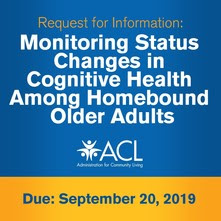

Request for Information: Monitoring Status Changes in Cognitive Health Among Homebound Older Adults
The Administration for Community Living is seeking input from stakeholders including academic and research universities, area agencies on aging (AAAs), State Units on Aging (SUAs), Aging and Disability Resource Centers, Centers on Independent Living, and non-profit organizations on assessing changes in cognitive health among homebound older adults. Cognitive health – which falls under the broad, umbrella term of brain health – refers to a person’s capacity to “remember, learn, plan, concentrate, and maintain a clear, active mind” [1]. Homebound older adults – when compared to non-homebound older adults – exhibit greater declines and may experience declines in cognitive health that can affect their quality of life and functional independence.
We are seeking input and responses to the following list of questions:
- What are the characteristics of older adults for whom you conduct cognitive screening tests?
- What screening test and/or (psychometric) instruments (e.g. tests of recall, attention, processing speed, etc.) does your organization use to measure cognitive health?
- What is the length and format (e.g. in-person, paper-and-pencil, telephone, web-based, tablet, smartphone, etc.) used to administer these screening tests and/or instruments to the population of older adults you test?;
- What is the frequency with which your organization administers these tests and/or instruments and the duration over which cognitive health is monitored?;
- What is your estimate of the general cost per person for administering the test or instrument?
- What happens when changes are detected in a person’s cognitive health and how is this information used?; and
- What are the intended health outcomes (e.g., screening for a research study, early identification and detection, improvement through exposure to new interventions, reductions in re-hospitalization, etc.) sought from monitoring cognitive health over a period of time?
Purpose:
The purpose of this Request for Information (RFI) is to gain feedback and input on existing efforts to monitor status changes to cognitive health in the homebound older adult population from individuals or groups including – but not limited to – those in the academic and research communities, Area Agencies on Aging (AAAs), State Units on Aging (SUAs), Aging and Disability Resource Centers, Centers for Independent Living, and nonprofit organizations among others.
This RFI is for information and planning purposes only and should not be construed as a solicitation or as an obligation on the part of the federal government or the Administration for Community Living. ACL does not intend to make any awards based on response to this RFI or to otherwise pay for the preparation of any information submitted to or for the government’s use of such information.
Background:
According to cross-sectional data collected in 2011 by the National Health and Aging Trends Study, approximately 2 million (5.59 percent) of the older adult Medicare population were completely or mostly homebound [2]. A number of studies comparing the health profiles of homebound older adults – as compared to non-homebound older adults – consistently report that homebound older adults tend to be older in age, have multiple chronic conditions, and more frequently use healthcare services including emergency department visits [3].
Underscoring the potential importance of tracking cognitive health among the homebound older adult population is recent evidence finding that self-reported memory difficulties are a strong predictor of the homebound status of older adults [3] and evidence that screening tools and measures may prove useful in identifying those who may be experiencing cognitive decline or dementia despite not having a diagnosis [4].
What We Hope to Learn From this Invitation:
ACL is issuing this RFI to obtain input on existing efforts to monitor status changes in cognition in the homebound older adult population. This information will help ACL better understand what services, supports, and innovations are needed to inform interventions and/or policies to address declines in cognitive health that occur over time in the homebound older adult population.
References:
- https://www.nia.nih.gov/
health/cognitive-health-and- older-adults; https://brainhealth.nia.nih. gov/ - Ornstein, Katherine A et al. “Epidemiology of the Homebound Population in the United States.” JAMA internal medicine vol. 175,7 (2015): 1180-6.
- Musich, Shirley, et al. "Homebound older adults: Prevalence, characteristics, health care utilization and quality of care." Geriatric Nursing 36.6 (2015): 445-450.
- Setter, S., Neumiller, J., Weeks, D., Borson, S., Scanlan, J., & Sonnett, T. (2009). Screening for undiagnosed cognitive impairment in homebound older adults. The Consultant Pharmacist®, 24(4), 299-305.
Addresses:
Comments should be submitted electronically to Dr. Vijeth Iyengar (vijeth.iyengar@acl.hhs.gov) with “RFI-Cognitive Health Status Changes Homebound Older Adults” in the subject line.
For Further Information Contact
Dr. Vijeth Iyengar (vijeth.iyengar@acl.hhs.gov) with “RFI-Cognitive Health Status Changes Homebound Older Adults” in the subject line.
It would be helpful to this RFI and ACL if you could structure your response in the following way:
- Name of respondent
- Preferred contact email
- Organizational affiliation(s)
- Response to questions in the order they appear in the summary section of this RFI
Comment Due Date:
To be assured consideration, comments must be received by 5 pm EST on September 20, 2019.





















.png)









No hay comentarios:
Publicar un comentario